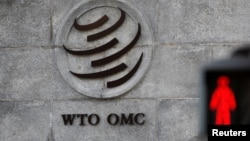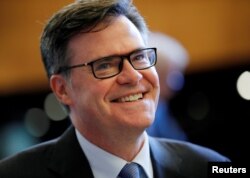The United States and China blamed each other for the crisis in the world trading system during a two-day "trade policy review" of the United States at the World Trade Organization.
The Chinese representative to the WTO, Hu Yingzhi, accused the United States of deforming the rules of world trade, which is having a detrimental impact on the economy and on American workers.
U.S. Ambassador to the WTO Dennis Shea retorted that the crisis was caused by China's trade-distorting practices. He disputed the charge that the United States is the center of the crisis, saying instead that the U.S. is the epicenter of the solution.
WTO Trade Policy Review Division Director Willy Alfaro described the two-day debate as lively and engaged. He told VOA that member states expressed a number of concerns, including worry about a shift of focus in the U.S. trade policy, which is based on five pillars.
"The first one is the adoption of trade policies supporting the national security policy," Alfaro said. "The second one is building a stronger U.S. economy and [third is] negotiating better trade deals, [fourth is] vigorous enforcement of domestic trade laws and rights under existing trade agreements, and finally reform of the multilateral trading system."
Alfaro said the U.S. has received a lot of support from member countries on the need to reform the multilateral trading system and to make it more transparent.
However, WTO officials said members also raised concerns regarding the introduction of new "Buy American" provisions, which could result in unnecessary trade barriers and increased protectionism.
They also criticized U.S. agricultural policy, particularly the limited market access for certain commodities, high tariffs, and the continued use of trade distorting support.





